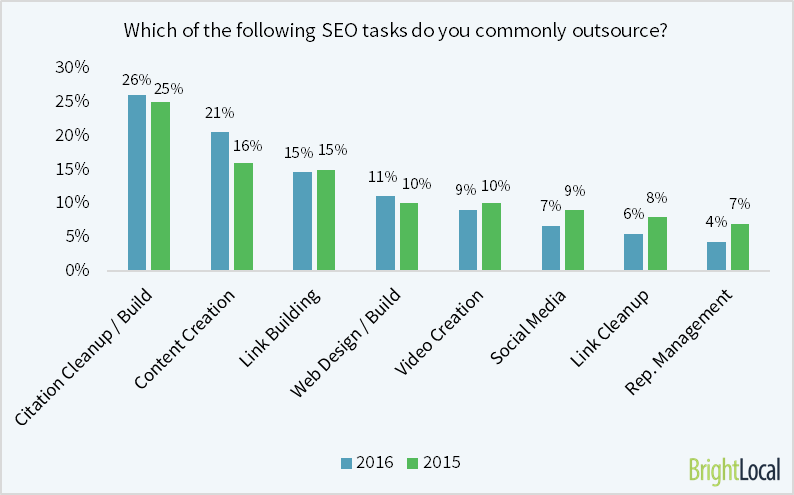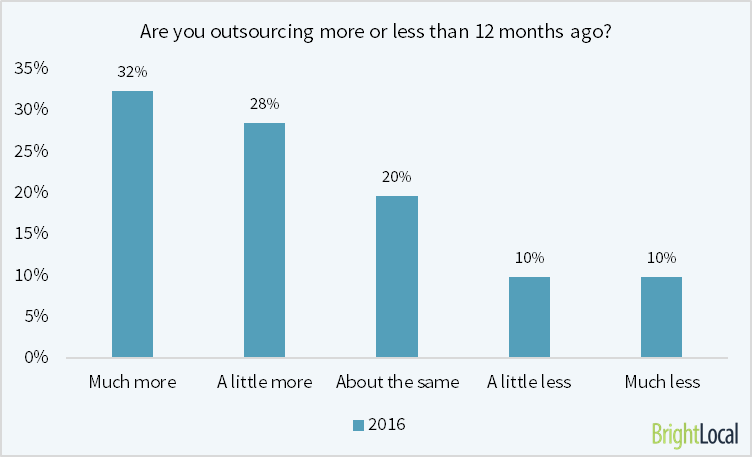60% of local SEOs are outsourcing more tasks in 2016 vs. 2015
What is the current state of outsourcing in the local search world? Columnist Myles Anderson takes a look at the results of a recent BrightLocal survey on the topic.
SEO outsourcing is a common practice in digital marketing, as it enables us to accomplish cumbersome or repetitive tasks that we might not otherwise have time for. It also gives access to expertise that a company may not have in-house, which is great for tackling complicated, specialist or technical tasks.
At BrightLocal, we wanted to find out which tasks are most commonly outsourced by local SEOs, how prevalent outsourcing is in the local search industry, and whether the most commonly outsourced tasks are changing over time. (You can find the full results on the BrightLocal blog, which includes numerous quotes and tips on outsourcing from survey participants.)
We polled 345 SEOs about their outsourcing activity and asked them to give us the pros and cons of outsourcing based on their own experience. This is the second time we’ve run the poll, having initially published it in 2015, so we’ve also included year-on-year comparisons wherever possible.
N.B. Poll respondents: 80 percent were based in North America, 13 percent in the UK and seven percent throughout the rest of the world.
Which local SEO tasks are most commonly outsourced?
Key findings:
- Citation Cleanup/Building is the most commonly outsourced task for local SEOs.
- Content creation is commonly outsourced and has seen the biggest increase since 2015.
- Link cleanup and reputation management are commonly kept in-house.
Analysis:
Year on year, there’s not a huge amount of change in the most outsourced tasks, with citation building and citation cleanup still at the top of the pile. Content creation has a five-percent increase year on year (the largest increase of all tasks), whilst link building remains consistent in third.
At the other end of the scale, Reputation Management, Link Cleanup and Social Media tasks are outsourced the least.
There are lots of reasons that SEOs choose to outsource, but alleviating the burden from dull, tedious or time-consuming tasks is one of the biggest. Citation cleanup and citation building certainly fall under this bracket, and we’ve seen a significant increase in SEOs and SMBs outsourcing their citation work.
The outsourcing of content creation has seen the biggest increase year on year (21 percent in 2016 vs. 16 percent in 2015), and while it’s not difficult to find outsourcers who offer content marketing, it’s a path you should tread carefully for both quality and content penalty reasons.
Furthermore, it can often be more beneficial for local businesses to produce their own content. They know their industry, services and location better than any paid blogger (hopefully), so they’re in the best position to create accurate, compelling and genuine content that will appeal to consumers and Google alike.
Outsourcing link building
When it comes to links, a number of poll respondents highlighted link building and link cleanup as dangerous tasks to outsource:
[blockquote cite=”Paul Tufts, Juiced SEO”]The important stuff like link building with all the anchor text issues is too big of a deal to outsource. Errors can cause nightmares.[/blockquote]
[blockquote cite=”Tom Etherington, Silverbean”]There are some tasks that we’d never outsource, though, as it could cause more damage than good, such as link building and cleanups, and we need to outsource other tasks to ensure we have expertise and resource available in-house to focus on these.[/blockquote]
Out of all the tasks included in the chart above, link building is the one that most SEOs would not want to get wrong. It’s imperative that backlink work is outsourced to a reputable agency or consultant — otherwise, more SEOs may end up looking for link cleanup outsourcers in 2017!
This brings us nicely to the main issue surrounding SEO outsourcing: quality of outsourcer.
Are local SEOs outsourcing more in 2016?
Any task can be outsourced, as long as you are confident that it is going to be done to a high quality. The struggle can often be in finding an organization or individual that you have a good working relationship with.
So is SEO outsourcing more or less commonplace year on year? Of those SEOs who do outsource, we asked whether they are doing so more or less since 2015.
Key findings:
- 60 percent are outsourcing more SEO tasks year on year.
- 20 percent are outsourcing fewer SEO tasks year on year.
Analysis:
Of the 60 percent who are outsourcing more tasks year on year, more than half of them are doing so “much more” than 2015. At the other end of the scale, of the 20 percent who are outsourcing fewer tasks year on year, exactly half of them are doing so “much less.”
So, why are SEOs outsourcing more local search tasks year on year?
We can attribute this to the sheer volume of tasks that the average SEO has to undertake, the complexity and difficulty (or tediousness) of those tasks, or even an increase in quality outsourcers available.
From our 2015 Local SEO Industry survey, we found that an SEO handles 14 clients on average, with more than 20 percent of SEOs handling more than 31 clients.
Certainly the traditional role of an SEO has changed over the years and will continue to do so. For this reason, outsourcing enables a consultant or agency to branch out and offer services they may not be able to offer in-house, thus allowing them to compete with larger competitors on a more manageable budget.
What are the pros & cons of SEO outsourcing?
In the poll, we also asked respondents to give us the pros and cons of SEO outsourcing based on their own experiences.
PROS
- Some types of work can be cheaper to outsource than to handle in-house.
- More mundane or repetitive tasks (such as data entry) can be offloaded to free up internal resources for more complex tasks.
- Hiring a specialist to handle a particular task can be more efficient than doing it yourself.
- Outsourcing can allow a business to scale more easily and take on more clients; this in turn can help smaller agencies to compete with their larger competitors.
- If outsourced work does not meet your standards, you can terminate the relationship more easily than with a salaried employee.
CONS
- For tasks that require a high level of technical expertise, outsourcing can be expensive — especially on a tight deadline.
- Outsourcing generally means less control over the process.
- Finding a good freelancer or company can be difficult, especially in niche areas like local SEO.
- You may be undermining your own ability to learn new skills or manage your time effectively.
- Managing staff/freelancers remotely can be a challenge, especially when there are cultural differences or language barriers.
- If the freelancer or company does bad work, the results could be devastating (e.g. shady link building activities that incur penalties).
Contributing authors are invited to create content for Search Engine Land and are chosen for their expertise and contribution to the search community. Our contributors work under the oversight of the editorial staff and contributions are checked for quality and relevance to our readers. The opinions they express are their own.
Related stories


